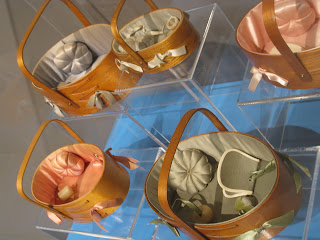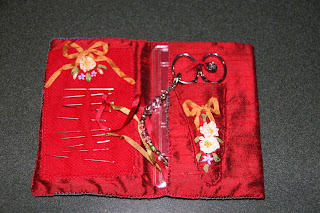While there I was lucky to catch an exhibition in one of the galleries that featured Shaker boxes and most of those on display were sewing boxes! The collection is part of a larger one owned by Stephen and Miriam Miller.
From the Museum website:
In the 1780s, the Shakers established a number of relatively
self-sufficient villages spread from Maine to Kentucky. Initially, the
Shakers separated themselves from the outside world to allow themselves
the freedom to pursue their unique spiritual vision and communal
lifestyle. It was not long before they realized that complete isolation
was not actually possible for a functional community, as there were
certain items, including glass, ceramics, metals, and salt, that they
could not produce from their lands. A cash economy was required, and
thus they began to create objects, such as “fancy” baskets and sewing
carriers, for sale.
While the Shakers fully embraced the concept of “profit,” they scrupulously adhered to the same standards of high quality production that were applied when creating objects for their own use. This exhibition offers viewers the opportunity to compare and contrast objects made for use by the Shakers, such as the large sewing chest from Enfield, Connecticut, and objects made for sale, including a number of oval sewing boxes, from Sabbathday Lake, Maine.
The photo shows Brother Delmer Wilson (1873-1961)in his workshop in 1923, along with 1,083 oval sewing boxes that he made in that year alone! The machine in the foreground is one he customized for large scale production of the boxes.
The first sewing carriers made in 1896 were round ones and then production switched to oval and they were made in the tens of thousands well into the 1950's. Brother Wilson produced the bodies and the Shaker sisters at the Sabbathday Lake Shaker community in Maine were responsible for lining them with silk and attaching the hand-made pin cushions, emery bags and needlecases. The cases were sold in the community's own gift shop as well as at resorts in New England and by catalog.
I wonder where all of the other boxes and baskets are now? I would love to have one in my collection!
While the Shakers fully embraced the concept of “profit,” they scrupulously adhered to the same standards of high quality production that were applied when creating objects for their own use. This exhibition offers viewers the opportunity to compare and contrast objects made for use by the Shakers, such as the large sewing chest from Enfield, Connecticut, and objects made for sale, including a number of oval sewing boxes, from Sabbathday Lake, Maine.
The photo shows Brother Delmer Wilson (1873-1961)in his workshop in 1923, along with 1,083 oval sewing boxes that he made in that year alone! The machine in the foreground is one he customized for large scale production of the boxes.
The first sewing carriers made in 1896 were round ones and then production switched to oval and they were made in the tens of thousands well into the 1950's. Brother Wilson produced the bodies and the Shaker sisters at the Sabbathday Lake Shaker community in Maine were responsible for lining them with silk and attaching the hand-made pin cushions, emery bags and needlecases. The cases were sold in the community's own gift shop as well as at resorts in New England and by catalog.
I wonder where all of the other boxes and baskets are now? I would love to have one in my collection!


























